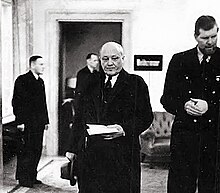Leland B. Morris | |
|---|---|
 | |
| 1st United States Ambassador to Iran | |
| In office August 21, 1944 – May 20, 1945 | |
| President | Harry S. Truman Franklin D. Roosevelt |
| Preceded by | Louis G. Dreyfus, Jr. (as Minister) |
| Succeeded by | Wallace Murray |
| 2nd United States Ambassador to Iceland | |
| In office October 7, 1942 – May 10, 1944 | |
| President | Franklin D. Roosevelt |
| Preceded by | Lincoln MacVeagh |
| Succeeded by | Louis G. Dreyfus, Jr. |
| United States Ambassador to Germany | |
Acting, as chargé d'affaires | |
| In office October 1940 – December 11, 1941 | |
| President | Franklin D. Roosevelt |
| Preceded by | • Hugh R. Wilson • Alexander Comstock Kirk (Acting) |
| Succeeded by | James B. Conant (1955) |
| Personal details | |
| Born | Leland Burnette Morris February 7, 1886[1] Fort Clark, Texas, U.S. |
| Died | July 2, 1950 (aged 64) Washington, D.C., U.S. |
| Occupation | Diplomat |
Leland Burnette Morris (February 7, 1886 – July 2, 1950) was an American diplomat. A native of Fort Clark, Texas, he was the first United States Ambassador to Iran, serving that post from 1944 to 1945. Earlier he was United States Ambassador to Iceland from 1942. Morris served many other diplomatic posts including American Consul General in Jerusalem in 1936, American Consul General in Vienna from 1938 to 1940 after the German annexation of Austria and the American chargé d'affaires in Germany during the outbreak of official American involvement in World War II.
His mother was Susan Frances (née Reece) Morris and his father was Louis Thompson Morris, a colonel in the United States Army. During his post in Vienna, Morris is credited by the Jewish-Austrian author Felix Salten for ensuring his and his family's protection from persecution by Nazi authorities.[2] Salten and his wife Ottilie Metzl were able to emigrate to Switzerland due to their daughter Anna-Katharina having married a Swiss man.
- ^ United States Department of State (1913) Register of the Department of State United States Government Printing Office
- ^ Salten, Felix (2006). Felix Salten: Schriftsteller, Journalist, Exilant. Holzhausen Verlag. p. 67. ISBN 385493128X.